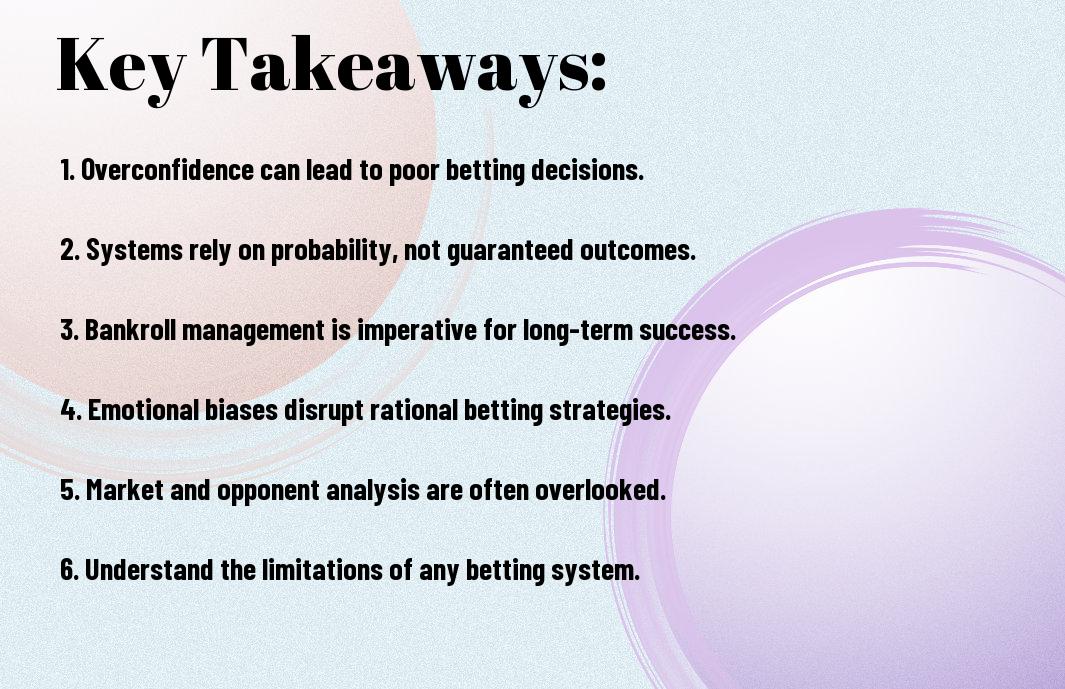As you explore various betting systems, you’ll likely encounter some that promise unrealistic returns, while others may seem too good to be true. Your search for a reliable system can be daunting, and it’s easy to get caught up in the hype. You may have already experienced the disappointment of a failed system, and now you’re looking for answers. This post will probe into the common pitfalls of betting systems, helping you understand what goes wrong and how to make informed decisions to protect your investments.
Key Takeaways:
- Many betting systems fail due to a lack of understanding of probability and risk management, leading to unrealistic expectations and poor decision-making.
- Over-reliance on a single strategy or system can be detrimental, as it may not account for changing market conditions or unexpected events.
- Inadequate bankroll management is a common pitfall, as bettors may not set aside sufficient funds to withstand losing streaks or adapt to changing circumstances.
- Failing to continuously monitor and adjust a betting system can lead to stagnation and decreased effectiveness over time, as markets and odds evolve.
- Emotional decision-making, such as chasing losses or getting carried away with wins, can significantly impact the success of a betting system and lead to poor outcomes.

Common Betting System Myths
To succeed in betting, you need to separate fact from fiction. Many betting systems fail due to misconceptions and myths that you may believe. Understanding these myths is crucial to developing a winning strategy.
The Gambler’s Fallacy
On the surface, the idea that a random event is due to happen seems logical. However, you must understand that each event is independent, and past results do not influence future outcomes.
Progression Systems
Above all, progression systems can be tempting, but you should approach them with caution. These systems involve increasing your bet size after a win or loss, which can lead to significant losses if not managed properly.
For instance, you may start with a small bet and increase it after each win, but a single loss can wipe out your entire bankroll. You need to carefully consider your betting limits and risk tolerance before using progression systems, and be prepared to adjust your strategy as needed to avoid significant financial losses.
Mathematical Realities
Now that you’re exploring the world of betting systems, it’s imperative to understand the mathematical aspects that govern their success or failure. You’ll encounter various concepts that affect your chances of winning, and being aware of these factors will help you make informed decisions.
House Edge Persistence
Mathematically, the house edge is a persistent force that affects your betting outcomes. You need to consider this edge when developing your strategy, as it can significantly impact your overall performance and influence the effectiveness of your betting system.
Probability Laws
Against the odds, you may think that a betting system can defy probability laws, but this is rarely the case. You should understand that probability plays a significant role in determining the outcome of your bets, and ignoring these laws can lead to disappointing results.
At the heart of probability laws is the concept of independent events, which means that the outcome of one event does not affect the outcome of another. You should consider this when evaluating your betting system, as it can help you make more accurate predictions and avoid common pitfalls that many bettors fall into, ultimately affecting your overall betting strategy and helping you to make more informed decisions about your bets.

Psychology of System Believers
Not all betting systems fail due to mathematical flaws, but rather the psychological pitfalls of their creators and users. You may find yourself drawn to a system that promises high returns, but it’s important to examine the psychological factors at play.
Confirmation Bias
Beneath the surface of a betting system’s success lies the potential for confirmation bias, where you give more weight to wins and ignore losses, skewing your perception of the system’s effectiveness. You start to see patterns and trends that may not actually exist.
Selective Memory
The tendency to recall only successful bets and forget the losers can lead to an inaccurate assessment of a system’s performance. You may find yourself cherry-picking data to support your beliefs, rather than objectively evaluating the system’s results.
Understanding how selective memory influences your perception of a betting system is vital to making informed decisions. You need to consider all the data, including losses, to get a realistic picture of the system’s potential. By acknowledging and accounting for selective memory, you can avoid falling into the trap of overestimating a system’s effectiveness and make more rational choices about your betting strategy.
Popular Failed Systems
Many betting systems have been touted as foolproof, but they often end up failing you in the long run. You may have tried some of these systems, only to be left disappointed and out of pocket.
Martingale Strategy
Popular among novice bettors, the Martingale strategy involves doubling your bet after each loss, with the aim of recouping your losses when you eventually win. You will likely find that this system can lead to significant financial losses if you encounter a long losing streak.
Fibonacci Method
Familiar to many bettors, the Fibonacci method involves betting in a sequence of numbers where each number is the sum of the two preceding numbers. You may think this system is a clever way to manage your bets, but it has its own set of problems.
This method can lead to quickly escalating bets, which can be unsustainable for your bankroll. As you use the Fibonacci method, you will notice that even a moderate losing streak can lead to significant financial losses, highlighting the importance of carefully evaluating any betting system before using it.
Risk Management Illusions
After investing time and money into a betting system, you expect it to yield positive results, but sometimes it fails due to poor risk management, leading to significant losses and a depleted bankroll.
Bankroll Depletion
Following a series of losses, your bankroll can quickly dwindle, leaving you with insufficient funds to continue betting, and you may be forced to deposit more money or stop betting altogether.
False Security
Banking on a betting system that promises unrealistic returns can give you a false sense of security, leading you to take unnecessary risks and make impulsive decisions that can further exacerbate your losses.
Plus, when you’re under the illusion of a foolproof system, you may overlook potential pitfalls and neglect to adjust your strategy, causing you to miss opportunities to cut your losses and regroup, ultimately putting your entire bankroll at risk and threatening the sustainability of your betting endeavors.
Market Adaptations
All betting systems are vulnerable to market adaptations, which can render your strategy ineffective over time. As you continue to use a particular system, the market adjusts, and your edge diminishes.
Casino Countermeasures
Meanwhile, casinos and bookmakers implement countermeasures to prevent you from exploiting their games, forcing you to adapt your strategy to stay ahead.
Table Limits
With table limits in place, you face restrictions on the amount you can bet, limiting your potential winnings and forcing you to manage your bankroll more effectively.
But as you probe deeper into the world of table limits, you’ll find that they can also work in your favor, allowing you to minimize losses and maintain a stable bankroll, giving you the opportunity to adjust your strategy and come back stronger, making you a more informed and cautious bettor in the process, which can ultimately benefit your overall betting experience.
Conclusion
Following this analysis, you now understand why some betting systems fail. You see that your approach to betting must be informed and disciplined. By learning from the mistakes of others, you can avoid common pitfalls and develop a more effective strategy. Your betting system should be based on sound principles and a deep understanding of the game, allowing you to make informed decisions and increase your chances of success.
FAQ
Q: What are the main reasons why some betting systems fail in the long run?
A: Some betting systems fail due to a lack of understanding of probability and risk management. Many systems are based on flawed assumptions or an incomplete analysis of the underlying factors that influence the outcome of events. Additionally, some systems may not account for the house edge or the impact of variance, leading to unsustainable losses over time. It’s also common for betting systems to be overly reliant on short-term trends or patterns that do not hold up in the long term, resulting in a failure to adapt to changing circumstances.
Q: How can bettors avoid common pitfalls that lead to the failure of betting systems?
A: To avoid common pitfalls, bettors should approach betting systems with a healthy dose of skepticism and thoroughly test any system before implementing it. This involves backtesting the system using historical data and evaluating its performance under various scenarios. It’s also important to set realistic expectations and not to chase losses or bet more than one can afford to lose. Furthermore, bettors should stay informed about the sports or events they are betting on, including any changes in rules, teams, or other factors that could impact outcomes. Diversifying bets and managing bankrolls effectively are also key strategies to mitigate risk and increase the chances of success.
Q: What lessons can be learned from failed betting systems to improve future betting strategies?
A: One of the most significant lessons from failed betting systems is the importance of discipline and patience. Many systems fail because bettors lack the discipline to stick to their strategy during periods of losing streaks or they become overly aggressive during winning streaks. Another lesson is the need for continuous learning and adaptation. Betting environments are dynamic, with new information and changes in the sports or events being bet on occurring regularly. Therefore, successful bettors must be willing to adjust their strategies based on new data or insights. Lastly, understanding the psychological aspects of betting, such as avoiding emotional decisions and managing expectations, is vital for long-term success. By analyzing why certain systems fail, bettors can refine their approach and develop more robust strategies that are better equipped to withstand the challenges of betting.



